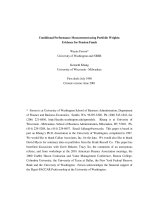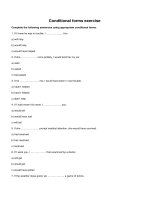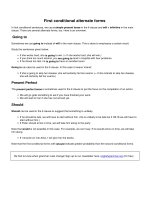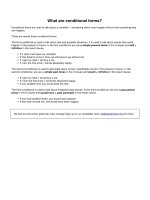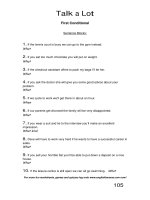First conditional alternate forms
Bạn đang xem bản rút gọn của tài liệu. Xem và tải ngay bản đầy đủ của tài liệu tại đây (11.84 KB, 1 trang )
First conditional alternate forms
In first conditional sentences, we use
a simple present tense
in the if-clause and
will + infinitive
in the main
clause. There are several alternate forms, too. Here is an overview.
Going to
Sometimes we use
going to
instead of
will
in the main clause. This is done to emphasize a certain result.
Study the sentences given below.
If she works hard, she
is going
to win. (= If she works hard, she will win.)
If you drink too much alcohol, you
are going to
land in hospital with liver problems.
If he drives too fast, he
is going to
have an accident soon.
Going to
can also be used in the if-clause. In this case it means ‘intend’.
If she is going to skip her classes, she will certainly fail her exams. (= If she intends to skip her classes,
she will certainly fail her exams.)
Present Perfect
The
present perfect tense
is sometimes used in the if-clause to put the focus on the completion of an action.
We will go grab something to eat if you have finished your work.
We will wait for her if she has not arrived yet.
Should
Should
can be used in the if-clause to suggest that something is unlikely.
If he should be late, we will have to start without him. (He is unlikely to be late but if HE IS we will have to
start without him.)
If Peter should arrive in time, we will take him along to the party.
Note that
would
is not possible in this case. For example, we can’t say: If he would arrive on time, we will take
him along.
If I should run into Alice, I will give her the books.
Note that the first conditional forms with
should
indicate greater probability than the second conditional forms.
Be first to know when grammar rules change! Sign up to our newsletter here: englishgrammar.org (It's free)
Powered by TCPDF (www.tcpdf.org)

